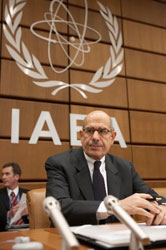
Director General of the IAEA Mohamed ElBaradei waits for
the start of the IAEA's 35-nation board meeting yesterday at Vienna's
International Center. -Xinhua
The board of the UN nuclear watchdog yesterday opened discussions over the
thorny issue of Iran's nuclear program.
The board of governors' meeting of the International Atomic Energy Agency
(IAEA) finally moved on to the key issue after two days of discussions over
nuclear safety and technology.
The IAEA board is to consider its next move after it decided on Feb. 4 to
report Iran's case to the UN Security Council.
Discussions are likely to surround a report of Mohamed ElBaradei, the IAEA
director general, on Iran's nuclear activities.
The report, which has been circulated among the IAEA board members since last
week and will be handed over to the UN Security Council immediately after the
board meeting, says the IAEA has no proof that Iran is seeking nuclear weapons.
But it also says clandestine activities cannot be ruled out at the moment due
to insufficient information.
Member states and country groups are expected to have different
interpretations of the report with the United States seeing it as proof that
action is needed against Iran, preferably from the UN Security Council.
But developing countries, especially those from the Non-Aligned Movement
(NAM), are expected to try to keep the issue within the framework of the IAEA,
or at least to let their voice be heard in the UN Security Council.
The American delegation told the board on Wednesday morning that ElBaradei's
report showed that Iran was not cooperating with the IAEA, according to a
diplomat attending the session.
However, it said the UN Security Council's involvement would be a gradual
process, indicating that Washington is not looking for immediate sanctions
against Tehran.
Washington said it supported a peaceful solution to the issue.
The message on Wednesday contrasted sharply with the remarks by a State
Department official attending the meeting on Tuesday.
ElBaradei's report made it clear that troubling issues remained unresolved,
said the official on condition of anonymity.
These issues include Iran's connections with the al Qaeda network, which, the
official said, runs a black market for nuclear weapons technology. Questions
also remain over the extent of the Iranian military's involvement in the
country's nuclear program.
ElBaradei's report made it clear that Iran's leaders were forging ahead to
achieve a complete nuclear fuel cycle capability. They were seeking to acquire
the material, equipment and expertise to produce nuclear weapons, the official
said.
The NAM countries, which comprise a total of 16 member states in the
35-nation IAEA board, coordinated their positions late on Tuesday. They are
expected to counter-balance the opinion of the West.
China believes the issue should be resolved through diplomacy.
It was very important for the international community to keep the consensus
of resolving the issue diplomatically under the framework of the IAEA, Chinese
Foreign Minister Li Zhaoxing told a press conference in Beijing on Tuesday.
The international community should not give up efforts toward this goal, he
said.
Iran resumed uranium enrichment after the Feb. 4 IAEA board resolution, which
was pushed through by the United States and the EU 3 -- Britain, France and
Germany.
Uranium enrichment is an advanced step in the nuclear fuel cycle that could
lead to the production of atomic bombs.
The EU3 angrily scrapped negotiations with Iran and sought for the Feb. 4
resolution after Tehran removed the seals of the IAEA and resumed nuclear fuel
research in January.
Iran temporarily agreed in November 2003 to suspend nuclear fuel activities
in exchange for political and trade incentives. But it resumed uranium
conversion, a step before uranium enrichment, in August 2005.



